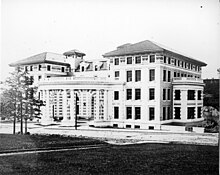
Margaret Morrison Carnegie College (MMCC) was the women's college for Carnegie Mellon University. It was founded in 1903 and opened its doors to students in 1906 as the Margaret Morrison Carnegie School for Women. The school was closed in 1973. [1]

Margaret Morrison Carnegie College (MMCC) was the women's college for Carnegie Mellon University. It was founded in 1903 and opened its doors to students in 1906 as the Margaret Morrison Carnegie School for Women. The school was closed in 1973. [1]
MMCC was founded in 1903 as one of the four colleges of the Carnegie Institute of Technology (Carnegie Tech). Andrew Carnegie, the founder of Carnegie Tech, named the college after his mother. MMCC's principal aim would be to train young women to earn their livelihood. [2]
The curriculum in the first year included principles of science and economics, history, English, accounts, social ethics, sewing, drawing, cookery, and personal hygiene. In their second and third years, students could choose to specialize in secretarial courses, household arts and institutional management, technical dressmaking, costume design, applied design, or architectural and interior decoration. [2]
Of the goals of the college, Eileen McConomy, steering committee chairperson of the MMCC Centennial, stated, "although some of the major disciplines available to us may seem archaic to current students, for our era they were relevant [...] our education was rigorous. Our women professors were the forerunners of the feminist movement and inspired us to take charge of our lives, to not be afraid to speak out for what we believed was right, and to demand excellence in all that we did." [2]
Margaret Morrison Carnegie College closed in 1973 due to declining enrollment: "Entering on the coattails of the 1950s were societal and institutional changes that would ultimately seal the fate of MMCC. Homemaking was less apt to be considered a profession; women students were turning increasingly to careers based in the liberal arts and sciences. A steadily climbing enrollment in these fields led to the integration of many MMCC programs into Tech’s other schools." [2]

The end of Margaret Morrison Carnegie College also marked the beginning of the College of Humanities and Social Sciences (now known as the Dietrich College of Humanities and Social Sciences), and several programs and departments were absorbed into the new college as well as the Mellon College of Science and College of Fine Arts. [3] Margaret Morrison Street runs through the west end of the campus. The Margaret Morrison Apartments [4] and the Margaret Morrison Courtyard [5] are located along the street. Margaret Morrison Carnegie Hall serves as the headquarters of the Carnegie Mellon School of Design and a principal facility of the Carnegie Mellon College of Fine Arts. In 2006, a dining facility called the Maggie Murph Café was opened within Hunt Library, the main library at Carnegie Mellon University. [6]
Alumnae of the college are known as Maggie Murphs. [2] Stephanie Kwolek, the inventor of Kevlar, graduated from Margaret Morrison Carnegie College in 1946 with a B.S. in General Science (Chemistry). [3] Newbery Medal winning-author E. L. Konigsburg is a 1952 graduate of Margaret Morrison Carnegie College. [7]

Carnegie Mellon University (CMU) is a private research university in Pittsburgh, Pennsylvania. The institution was originally established in 1900 by Andrew Carnegie as the Carnegie Technical Schools. In 1912, it became the Carnegie Institute of Technology and began granting four-year degrees. In 1967, it became the current-day Carnegie Mellon University through its merger with the Mellon Institute of Industrial Research, founded in 1913 by Andrew Mellon and Richard B. Mellon and formerly a part of the University of Pittsburgh.


The Heinz College of Information Systems and Public Policy, also known as Heinz College, is the public policy and information college of Carnegie Mellon University in Pittsburgh, Pennsylvania. It consists of the School of Information Systems and Management and the School of Public Policy and Management. The college is named after CMU's former instructor and the later U.S. Senator John Heinz from Pennsylvania.

The University of Maryland, Baltimore County (UMBC) is a public research university in Catonsville, Maryland. It has a fall 2022 enrollment of 13,991 students, 61 undergraduate majors, over 92 graduate programs and the first university research park in Maryland. It is classified among "R1: Doctoral Universities – Very High Research Activity".

California State University San Marcos is a public university in San Marcos, California. It was founded in 1989 as the 21st campus in the California State University (CSU) system.

The University of Wisconsin–Milwaukee is a public urban research university in Milwaukee, Wisconsin. It is the largest university in the Milwaukee metropolitan area and a member of the University of Wisconsin System. It is also one of the two doctoral degree-granting research universities and the second largest university in Wisconsin.

John Patrick "Pat" Crecine was an American educator and economist who served as President of Georgia Tech, Dean at Carnegie Mellon University, business executive, and professor. After receiving his early education at public schools in Lansing, Michigan, he earned a bachelor's degree in industrial management, and master's and doctoral degrees in industrial administration from the Graduate School of Industrial Administration at Carnegie Mellon University. He also spent a year at the Stanford University School of Business.

Georgia Southern University is a public research university in the U.S. state of Georgia. The flagship campus is in Statesboro, with additional campuses in Savannah and Hinesville. Founded in 1906, Georgia Southern is the fifth-largest institution in the University System of Georgia. Southern offers over 140 different academic majors in the bachelor's, master's, and doctoral levels. The university has a combined enrollment of approximately 27,000 students from all 50 states and over 80 countries. Georgia Southern is classified among "R2: Doctoral Universities – High research activity" and a comprehensive university by the University System of Georgia.

Kentucky Wesleyan College (KWC) is a private Methodist college in Owensboro, Kentucky. Fall 2018 enrollment was 830 students.
The Marianna Brown Dietrich College of Humanities and Social Sciences is the liberal and professional studies college and the second-largest academic unit by enrollment at Carnegie Mellon University in Pittsburgh, Pennsylvania, USA. The college emphasizes study through rigorous analysis and technology of the behaviors, institutions, and beliefs that constitute the human experience, describing itself as “not an ordinary liberal arts school.” The college was named for Marianna Brown Dietrich, the mother of philanthropist William S. Dietrich II, after his donation of $265 million to the university in 2011 – the largest single donation in Carnegie Mellon history.

Revelle College is the oldest residential college at the University of California, San Diego in La Jolla, California. Founded in 1964, it is named after oceanographer and UC San Diego founder Roger Revelle. UC San Diego—along with Revelle College—was founded at the height of the Space Race between the United States and the Soviet Union. As a result, the initial class of 181 undergraduates comprised only 30 non-science majors. Revelle College focuses on developing "a well-rounded student who is intellectually skilled and prepared for competition in a complex world."
The Department of Social and Decision Sciences (SDS) is an interdisciplinary academic department within the Dietrich College of Humanities and Social Sciences at Carnegie Mellon University. The Department of Social and Decision Sciences is headquartered in Porter Hall in Pittsburgh, Pennsylvania and is led by Department Head Gretchen Chapman. SDS has a world-class reputation for research and education programs in decision-making in public policy, economics, management, and the behavioral social sciences.
Carnegie Mellon University is home to a variety of unique traditions, some of which date back to the early days of its over 100-year history. Many of these traditions hearken to the university's strength in engineering, such as the buggy races and the mobots, while others are purely social in nature, such as Spring Carnival and The Fence.

The School of Design at Carnegie Mellon University is a degree-granting institution within a private university in Pittsburgh, Pennsylvania, United States. The School of Design is one of five schools within the Carnegie Mellon College of Fine Arts offering both under and post graduate education. The School is accredited by Middle States Association of Colleges and Schools and awards BDES, MA, MDES, MPS, MII-PS, DDES, and PhD degrees. The School of Design has 21 full-time and 10 adjunct faculty.

Housing at the Massachusetts Institute of Technology (MIT) consists of eleven undergraduate dormitories and nine graduate dorms. All undergraduate students are required to live in an MIT residence during their first year of study. Undergraduate dorms are usually divided into suites or floors, and usually have Graduate Resident Assistants (GRA), graduate students living among the undergraduates who help support student morale and social activities. Many MIT undergraduate dorms are known for their distinctive student cultures and traditions.

Kennesaw State University (KSU) is a public research university in the state of Georgia with two campuses in the Atlanta metropolitan area, one in Kennesaw and the other in Marietta on a combined 581 acres (235 ha) of land. The school was founded in 1963 by the Georgia Board of Regents using local bonds and a federal space-grant during a time of major Georgia economic expansion after World War II. KSU also holds classes at the Cobb Galleria Centre, Dalton State College, and in Paulding County (Dallas). The total enrollment exceeds 45,000 students making KSU the third-largest university by enrollment in Georgia.
Erwin Ray Steinberg was an American scholar and professor.

Rutgers University–New Brunswick is one of three regional campuses of Rutgers University, a public land-grant research university consisting of four campuses in New Jersey. It is located in New Brunswick and Piscataway. It is the oldest campus of the university, the others being in Camden and Newark. The campus is composed of several smaller campuses that are large distances away from each other: College Avenue, Busch, Livingston,Cook, and Douglass, the latter two sometimes referred to as "Cook/Douglass", as they are adjacent to each other. Rutgers–New Brunswick also includes several buildings in downtown New Brunswick. It is classified among "R1: Doctoral Universities – Very high research activity". The New Brunswick campuses include 19 undergraduate, graduate, and professional schools. The New Brunswick campus is also known as the birthplace of college football.
Linda C. Babcock is an American academic. She is the James M. Walton Professor of Economics and former dean at Carnegie Mellon University's Heinz College, and is the former head of the Social and Decision Sciences department. She is also the founder and faculty director of the Program for Research and Outreach on Gender Equity in Society (PROGRESS).

The campus of Stony Brook University is located in Stony Brook, New York, and consists of 213 buildings over 1,454 acres of land. It is the largest public university in the state of New York in terms of land area. The campus was moved to Stony Brook in 1962 after originating in Oyster Bay, New York.